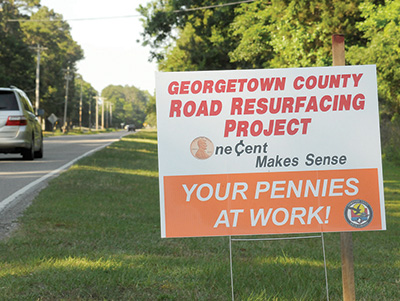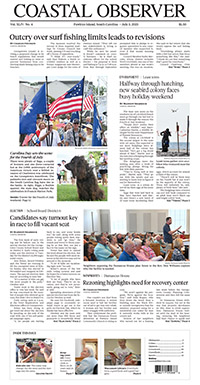Georgetown County
Tax panel agrees to guardrails for capital project requests

When the group preparing the ballot for a capital projects sales tax starts accepting proposals next month they will be looking at who will do the work as well as how much that work will cost.
“Even if a need is articulated, does the project have the backing where it can be completed?” said Jim Hipp, a former county administrator who is advising the Georgetown County Capital Sales Tax Commission. “I think we’re going to have to evaluate that as closely as the numbers.”
The six commission members met for the first time this week. They were asked by County Council to draft a referendum question listing the projects by the end of April. If approved by the council it will go before voters in November.
Hipp was deputy administrator in Spartanburg County when voters passed a $151.5 million sales tax referendum to build a joint city-county judicial center. He is now a senior advisory with the International City County Management Association.
Georgetown County expects to raise about $10 million a year in revenue from a 1-cent sales tax. It could be imposed for up to eight years. That’s something the commission will have to decide.
A similar tax approved by voters in 2014 raised $41 million over four years. But a commission formed in 2020 to prepare another sales tax referendum received over $459 million worth of project requests. The council stopped the effort in the midst of the coronavirus pandemic before a referendum question was drafted.
The new commission – Harris Chewning, Gary Cooper, Robert Crenshaw, Mark Hawn, Ashley Nelson and Reed Tiller – took no formal action but agreed in general that project proposals this time will need to be submitted by entities that can actually conduct them.
Walt Ackerman, the county’s director of Administrative Services, will prepare a score sheet for the commission, send out notices to other state and local government entities that may want to partner with the county on projects, and create an online for submissions.
Hawn asked whether the commission should refer proposals from the public to those other entities.
“That would be my preference,” Ackerman said.
“This is not a letter to Santa Claus,” Hipp said.
While the public is likely to contact the commission members with ideas, Cooper said he prefers those come through the portal.
“It’s not going to sway my opinion” to get a personal request, he said, adding that he thinks the commission needs to be unanimous in whatever it presents to County Council, “like a jury.”
The county will reach its borrowing capacity with a $66 million bond issue to fund a new jail. That means the capital projects in the sales tax referendum will be paid for as the tax is collected.
And since the projects have to be completed in the order listed on the ballot, leading with a $30 million project means it could take three years to start the actual work, Ackerman said.
That’s also why it will be important to have accurate estimates of the cost and the scope of each project, Hipp said. “So the scope of the project doesn’t creep on us.”
He used the example of a road project that is included for funding, but then requires additional right of way to complete.
The 2014 referendum included $1.5 million for a new fire and police complex in the town of Andrews. The county later added another $1.5 million. But the town started work on a $5.7 million municipal complex, asking the county to cover the difference from surplus sales tax revenue.
When the county declined, the town sued. That case is still pending in Circuit Court. The facility is unfinished.
The commission’s work doesn’t necessarily have to lead to a referendum, Hipp said.
“This commission has the authority to go back to the County Council and say we have no question,” he said.
Unlike what he saw in Spartanburg, in Georgetown County “I haven’t heard anyone say ‘these are the best two or three projects,’” Hipp said.
Cooper wondered if there were projects already in line for funding.
“I think there are some informal lists out there,” Hawn said.
Angela Christian, the county administrator, told the commission that the Public Works department will have road projects to propose, including some on state-owned roads.
There is another project “that’s already in the works,” which she declined to specify.
The commission agreed to meet three times in January and again in February and to move their meeting locations around the county, starting with the Carvers Bay Library on Jan. 25 and then moving to Andrews and Pawleys Island in February.




